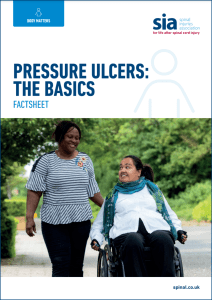Blog
Stop the Pressure Day 2024 - Kumbi Kariwo
“Our commitment should be about ensuring that each individual receives care that respects their cultural identity, understands their specific health contexts, and makes them feel truly seen and supported.”

Kumbi Kariwo, Health Inequalities Lead at Birmingham Community Healthcare NHS Foundation Trust, has recently been made aware of the gap in the knowledge for staff and patients when it comes to managing Pressure Ulcers in darker skin tones in relation to individuals that have Spinal Injuries.
Kumbi is keenly interested in developing training resources that can be utilised across the NHS to avoid complications for more patients. She would like to create an adaptive, responsive resource that recognises the unique needs of our diverse patient populations.
“Our core objective needs to establish consistent, high-quality care standards that are flexible enough to respect local community characteristics while maintaining a foundational commitment to inclusive, patient-centred healthcare. This means creating resources that are not just uniform, but genuinely responsive to the diverse realities of patient experiences.”
As a healthcare professional in Birmingham, I’ve experienced firsthand how vital culturally competent and inclusive care is for our diverse community. While the level of ethnic diversity might vary between regions like Birmingham and Brighton, the core principle remains the same: every patient deserves personalised, respectful, and high-quality care.
In Birmingham, our multicultural environment has naturally led to us exploring how we can integrate cultural sensitivity into our daily practice. However, it is important to acknowledge, that in areas with less visible diversity, this approach might require more intentional effort. Even if there’s only one patient from a different cultural background, they deserve comprehensive, culturally sensitive healthcare that acknowledges their unique needs and experiences.
Our commitment should be about ensuring that each individual receives care that respects their cultural identity, understands their specific health contexts, and makes them feel truly seen and supported.”
Research has shown that skin tone variations can impact diagnostic accuracy, wound assessment, and treatment monitoring. I hope that we can look at developing Guidelines for Pressure Ulcer management in Spinal Injuries patients with darker skin tones in collaboration with the Spinal Injuries Association that can be utilised across the NHS.
For more information on pressure ulcers, please visit Spinal Injury & Caring For Your Skin | SIA.
